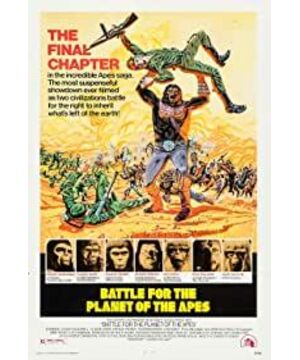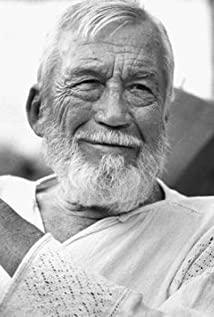There is no permanent banquet in the world, and the old version of the "Planet of the Apes" series has finally come to an end here in the fifth "Battle of the Apes". Since the first blockbuster of "Planet of the Apes", this series has launched a sequel at a rate of almost one a year. Later generations may only be comparable to the two major series of "Harry Potter" and "Saw Terror". .
However, "One is not as good as one" to describe the "Planet of the Apes" series is really appropriate. Numbers can't deceive people, whether it is budget (from 5.8 million US dollars in the first part to 1.8 million US dollars at the end), box office (from more than 33 million US dollars in the first part to 8.8 million US dollars at the end), or in connotation, this series Has been going downhill. Although the truth is that the sequel is not easy to shoot, the film's intention to squeeze out its commercial value is the culprit. The famous film critic Roger Albert once joked: ""Battle of the Apes" looks dying like this dying series. This movie just wants to make more money from the remaining fans."
In fact, we can see how unreliable it is from the perspective of the film's screenwriter appointment. Paul Dern, the screenwriter of the entire series, had already written the framework for this film, but he quit due to illness. The film crew immediately invited the Clinton brothers to rewrite the script. The problem is that not only did the brothers not participate in any sci-fi movie screenwriters, but they also never even watched the "Planet of the Apes" series. What's more confusing is that Dern came back later and made major revisions to the Clinton Brothers' script. Under such a toss, the quality of the script can be seen.
The only positive effect of "Battle of the Apes" is to complete the closure of the entire series on the timeline. From George Taylor boarded a spacecraft to explore the universe in 1972, to the destruction of the Planet of the Apes in 3955, to the return of the surviving apes to the Earth in 1973, to the establishment of the apes city in 2015, the story of the entire Planet of the Apes A complete and circular timeline is formed. Logically speaking, the timeline of this circular structure is somewhat confusing. It can be said that there would be no ape uprising without human exploration of the universe. However, we don't have to worry about the infinite loop of traveling back and forth. What happened in the past is not important, and the result of the moment is wakeful, just like the shocking glance at the end of the first film.
Let's take a closer look at "Battle of the Apes", trying to find something that could have been more intense from the screenwriter's vague, mediocre narrative. Compared with the extremely dark previous "Apes of the Apes", the tone of this work is much brighter. Humans have not been driven to extinction. Under the leadership of Caesar, the apes try to maintain a balanced relationship with humans. Pacifism has become the film’s main feature. Main melody.
Caesar is obviously an idealist. Martin Luther King once published "I Have a Dream" calling for racial equality, but Caesar's dream is much larger, transcending race and rising to the height of species. But in its era, this did not exist, a series of internal and external troubles easily smashed Caesar's soap bubbles. The gorillas, headed by General Aldo, a militant who hates humans among the apes, not only killed Caesar’s son, but also seized the armory in an attempt to overthrow Caesar. The survivors of the nuclear explosion in the ruins still wanted to eliminate them. The ape tribe even used the nuclear bombs left over to destroy them one by one.
Limited by the clumsy script, we can't know how tormented Caesar in the cracks, and the method of Caesar's peace of war and cutting off the traitors in the film is also nothing wonderful. The opportunity to raise the connotation of the work to a higher level was missed in vain, and it was only carried over with tears on the statue of Caesar. Looking back, from the "Book of Rites": "A journey on the road, the world is the public." To the original intention of the United Nations after World War II, "Universal Unity" has always been a dream with a strong idealistic color. Can human beings recover from a thousand-year-old disease that human beings can't cure by themselves? Caesar’s confusion is nothing more than the continuation of countless sages and philosophers, which is strange!
♑
View more about Battle for the Planet of the Apes reviews











